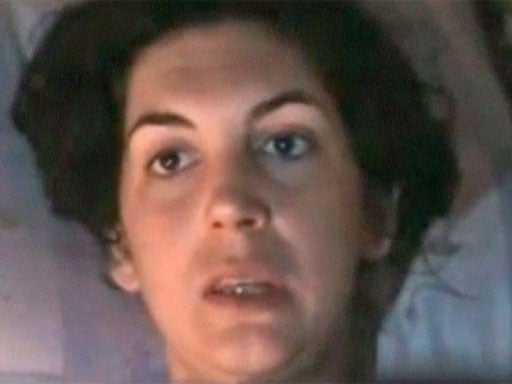Wounded French journalist Edith Bouvier leaves Beirut

Your support helps us to tell the story
From reproductive rights to climate change to Big Tech, The Independent is on the ground when the story is developing. Whether it's investigating the financials of Elon Musk's pro-Trump PAC or producing our latest documentary, 'The A Word', which shines a light on the American women fighting for reproductive rights, we know how important it is to parse out the facts from the messaging.
At such a critical moment in US history, we need reporters on the ground. Your donation allows us to keep sending journalists to speak to both sides of the story.
The Independent is trusted by Americans across the entire political spectrum. And unlike many other quality news outlets, we choose not to lock Americans out of our reporting and analysis with paywalls. We believe quality journalism should be available to everyone, paid for by those who can afford it.
Your support makes all the difference.Two French journalists who had been smuggled out of Syria flew to France today, a week after one of them suffered injuries in the restive central Syrian city of Homs, officials said.
Edith Bouvier and William Daniels were taken on a medically equipped plane, said airport officials who spoke on condition of anonymity because they were not authorized to speak to the media. Francois Abi Saab, a French Embassy spokeswoman, confirmed the two journalists left Lebanon.
Earlier today, a senior Lebanese security official said Bouvier and Daniels were smuggled across the Lebanese-Syrian border into the northeastern part of Lebanon's Bekaa Valley. Bouvier was then taken to the Hotel-Dieu de France hospital in Beirut, where she arrived earlier.
Bouvier, 31, was wounded in a rocket attack on February 22 during a government onslaught on the rebel-held neighborhood of Baba Amr. The attack killed two Western journalists — American reporter Marie Colvin and French photographer Remi Ochlik — and wounded a British photographer, Paul Conroy.
Daniels was not hurt in the attack.
A video posted online by activists soon after showed Bouvier lying on a hospital gurney with a white cast stretching from her left ankle to her thigh. In another video, Bouvier said her leg was broken in two places and that she needed an operation that local medics couldn't perform. Daniels stood at her side and pleaded for help.
"It is difficult here. We don't have electricity. We don't have much to eat. The bombs continue to fall," he said.
The security official, speaking on Friday on condition of anonymity in line with regulations, said the convoy of ambulances and police vehicles drove through the mountains of Lebanon amid a heavy snow storm to bring Bouvier to Beirut.
In a video obtained by The Associated Press before Bouvier was taken to Beirut's Hariri Airport in an ambulance, she was seen in her hospital bed looking in good condition.
French President Sarkozy said late on Thursday that Bouvier and another journalist William Daniels of France had been successfully smuggled into Lebanon.
"I had (Bouvier) on the phone. She is with her colleague, outside Syria," Sarkozy said during an impromptu news briefing in Brussels. "She has suffered a lot, but she will give the details herself."
French Foreign Minister Alain Juppe expressed his "immense joy" that the two were safe in Lebanon.
"They were taken in by the French Embassy in Beirut and everything is being done to ensure their medical care and their repatriation as soon as possible," Juppe said.
Also stuck in the rebel-held neighborhood, which has been under a tight government siege and daily shelling for nearly four weeks, was Javier Espinosa of Spain. He, too, was smuggled into Lebanon this week.
He described life in the neighborhood during the siege.
"The people just hide during the day — just waiting not to be hit because it was a matter of luck," he said in an interview with BBC. "There was no logic. They were shelling randomly, randomly from one corner to the other corner in the neighborhood."
He said people would only go out after dark.
"They went outside at night and tried to pick up the pieces of houses that were demolished and get some food and try to get some supplies for people inside that could not move."
On Thursday, videos released by activists in Syria said Colvin and Ochlik were buried in Baba Amr. But obscuring the picture, the Syrian government said on Thursday it had disinterred their bodies and would repatriate them.
Reached at her home in East Norwich, New York, on Thursday night, Colvin's mother, Rosemarie, said the family had received conflicting reports about her daughter's body.
"We're not getting any kind of decent information. It's all contradictory," she said. It was unclear if she had seen the video.
The videos and Bouvier's and Daniels' escape were steps toward the end of the ordeal of the six journalists who had sneaked into Syria illegally to report on the uprising against President Bashar Assad and found themselves trapped inside the besieged Homs neighborhood of Baba Amr.
The Syrian government has prevented most reporters from working in the country, and many journalists have been crossing into Syria illegally from Lebanon and Turkey.
The Baba Amr section of Homs has been the target of the heaviest Syrian military shelling during a four-week siege of rebel-held parts of Homs. Rebel forces said Thursday they were pulling out of the neighborhood, and a Syrian government official said the army had moved in. Activists say hundreds have been killed in Homs.
AP
Join our commenting forum
Join thought-provoking conversations, follow other Independent readers and see their replies
Comments